|
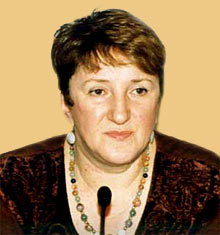 Galina
Starovoitova Galina
Starovoitova
Galina Starovoitova (1946-1998), one of the original
leaders of Russia's perestroika-era democratic movement. She
was the only woman nominated for the Russian presidency in
the 1996 election. Galina was a cofounder of the reformist
Democratic Russia Party and served as its chairperson. She
is remembered as an advocate of human rights and a champion
for political reform in Russia. Shot to death in the stairwell
of her home on Griboyedov Canal in central St.
Petersburg in November 1998, in what "appears
to be a political assasination". At the time of her
death, Galina was State Duma deputy.
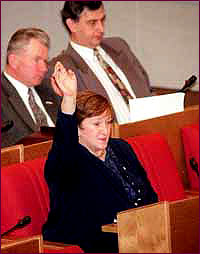 She
received her B.A. from Leningrad College of Military Engeneering
in 1966 and her M.A. in social psychology from Leningrad University
1971. Her Ph.D. in social anthropology from the Institute
of Ethnography, USSR Academy of Sciences explored ethnic groups
in the modern Soviet city. She has also published extensively
on anthropological theory and cross-cultural studies. Starovoitova
also served as Russian president Boris Yeltsin's advisor on
ethnic issues in 1991 and 1992, though she resigned because
of differences over Kremlin policy in the Caucasus. She
received her B.A. from Leningrad College of Military Engeneering
in 1966 and her M.A. in social psychology from Leningrad University
1971. Her Ph.D. in social anthropology from the Institute
of Ethnography, USSR Academy of Sciences explored ethnic groups
in the modern Soviet city. She has also published extensively
on anthropological theory and cross-cultural studies. Starovoitova
also served as Russian president Boris Yeltsin's advisor on
ethnic issues in 1991 and 1992, though she resigned because
of differences over Kremlin policy in the Caucasus.
Galina Starovoitova is described by her friends, relatives,
allies and political opponents. Everybody says that being
uncompromising in everything she did, she posed an obstacle
to many, and she was dealt with in a straightforward Stalinist
way: "No person - No problem - a purely Russian Murder"
On a cold, November night in St. Petersburg, three
bullets to the
head ended the life of Galina Starovoitova.
On November 20, 1998, Starovoitova and her aide, Ruslan
Linkov, were heading up the staircase of her apartment building
when they were shot by waiting assailants. In a manner similar
to the contract killings that have plagued Russia for the
last several years, the guns were dropped at
the scene and the assailants fled to a waiting car. Starovoitova,
co-chair of the Democratic Russia party, died at the scene.
Linkov survived with injuries to the head and neck.
As the news spread throughout St. Petersburg, citizens overwhelmed
by over four years of assassinations of prominent politicians,
businessmen,
bankers and members of the media, turned their grief into
a visible show of support for Starovoitova's life and quest
for a more democratic future for the country. "My
first feeling was horror," explains Olga Lipovskaya,
the director of the St. Petersburg Center for Gender Issues,
a non-governmental feminist organization and resource center
in St. Petersburg. "horror
about my country's morals ... It was a feeling of helplessness
and desperation."
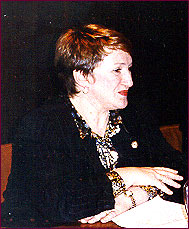 Starovoitova,
the first woman to be murdered in the wave of political violence
that has destabilized St.Petersburg, was also a grandmother
devoted to her family. "Violence
is not foreign to Russians by any means, but they have their
limits ... [Starovoitova became] a martyr, an unintentional
martyr. She's somebody who will be a symbol of courage and
outspokenness, and [she's] someone who Starovoitova,
the first woman to be murdered in the wave of political violence
that has destabilized St.Petersburg, was also a grandmother
devoted to her family. "Violence
is not foreign to Russians by any means, but they have their
limits ... [Starovoitova became] a martyr, an unintentional
martyr. She's somebody who will be a symbol of courage and
outspokenness, and [she's] someone who
suffered because of it."
In the midst of a contentious local election, many
residents of St.
Petersburg - in addition to such international human rights
groups as
Amnesty International - were openly speculating that Starovoitova's
murder had to do with her critical public statements about
the leaders of nationalist and Communist factions. Earlier
in November, Starovoitova had stated that she knew the names
of politicians receiving bribes from mafia members, among
other details of corruption in the local elections.
According to an Amnesty International report released
after her death, Starovoitova had also announced that she
knew that the seat in the St. Petersburg local elections had
been sold for $100,000 to a criminal group from the city of
Tambov.
But Lipovskaya from Amnesty International believes
that despite her outspoken tendencies, Starovoitova didn't
have a sense of what kind of danger she was truly in: "She
was always very open and maybe too sincere for a politician."
Starovoitova's sincerity in politics did not go unnoticed
by the people around her. She worked with human rights activist
Andrei Sakharov and was a member of the Moscow Helsinki Group.
In 1989, Starovoitova was elected a USSR Member of Parliament
from Yerevan, although she had four male rivals for her position.
In 1990, St. Petersburg also elected her to the Russian Parliament,
so that Starovoitova simultaneously held two positions in
both parliaments; no other Russian woman had ever accomplished
this before.
Despite their massive round-ups of 'suspects,' FSB
developments in
the Starovoitova murder case are painfully slow and unrevealing.
Indeed, the record of the FSB is dismal when it comes to catching
the perpetrators behind several political murders in St. Petersburg
and throughout Russia. In addition to the murders of five
other
parliamentarians, St. Petersburg Vice Mayor Mikhail Manevich,
investigative journalist Dmitry Kholdov, television commentator
Vladisalav Listiev, and others
have been killed. In an apparent grab for political and economic
power by crime syndicates and politicians alike, victims have
also included businessmen, bankers, and city port managers.
Ultimately, many Russian citizens and activists have
their doubts
that the FSB will ever catch the killers, perhaps owing to
the fact that
the assassins may have vanished back into the ranks of the
security service itself. Only two days before Starovoitova
was murdered, numerous FSB officers came forward at a press
conference in Moscow, alleging that their organization had
been operating a covert hit squad, carrying out extortion,
hostage-taking and contract killings.

Every day that goes by without progress on this case
- or on any
other unsolved local assassination - leaves its citizens more
frustrated, and its progressive activists and politicians
even more conscious of the fact that Starovoitova was unlikely
to have been the last target of St.Petersburg's brutally violent
political climate.

|
|
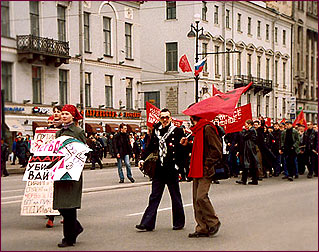
|

|
|
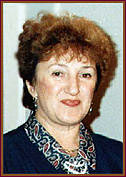 Braving
freezing temperatures, thousands of ordinary Russians and
dignitaries gathered to say farewell to a slain lawmaker. Braving
freezing temperatures, thousands of ordinary Russians and
dignitaries gathered to say farewell to a slain lawmaker.
About 10,000 people paid their final respects to Galina
Starovoitova. The line was so long that her funeral was
delayed so every mourner could have a chance to pass by her
casket.
In another tribute, people across Russia's dimmed their
lights in her memory for a few minutes at 8 p.m. Moscow time.
No one can quite shake the frightening feeling that
Russia has crossed a dangerous line. The warnings of impending
fascism that in the past seemed
hysterical or contrived have, since Starovoitova's execution-style
slaying, a chilling ring of plausibility.
Starovoitova herself had been one of the early and
persistent warners. "One cannot
exclude the possibility of a fascist period in Russia,"
she had said after the 1993 elections. Hours before her murder,
she had requested a Kremlin meeting on the growing dangers
of political extremism.
"Galina Starovoitova is an
inspiration. Her integrity in public office was unquestioned.
Her sense of fairnesss was legendary. Her leadership was undaunted
in the face of challenge after challenge. She was a role model."
- Lynn Hinkle, President, Women of the World.
Nobody knows why Starovoitova
was killed and why a crime like that is possible in Russia.
The shooting has brought forth calls to end the violence
and lawlessness that has plagued post-Soviet Russian society.
Russia media has widely described her death as the first politically
motivated murder since the Soviet Union's collapse. The victims
of previous killings have been mostly males with business
interests.
Galina Starovoitova's death has raised questions regarding
the state of human rights issues in modern Russia. At the
time of her death, she was not a powerful political figure
or threat. She was, however, a figure that many Russian people
associated with ethnic concerns, social issues and the basic
rights of all peoples. As a result, her murder begs, not only
the question of who did it, but why.
Former Prime Minister Viktor Chernomyrdin urged Russia's
quarrelsome pro-democratic reform groups to unite in the wake
of Starovoitova's death. "These
shots were fire at all of us ... if people start talking to
politicians in the language of bullets, then we can imagine
where that will get us," - he said.
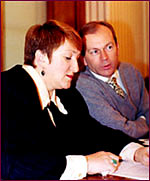 On
February 28, 2002, the deputy chief of Russia's Interior Ministry's
Main Criminal Police Department announced that international
and federal arrest warrants have been issued for Starovoitova's
assassins. He did not name the suspects but said they were
living abroad. On
February 28, 2002, the deputy chief of Russia's Interior Ministry's
Main Criminal Police Department announced that international
and federal arrest warrants have been issued for Starovoitova's
assassins. He did not name the suspects but said they were
living abroad.
Present and wounded during her killing, Starovoitova's
assistant, Ruslan Linkov, says authorities do not need to
look abroad but in their own backyard to find who committed
this crime.
While justice may eventually be served to those who ended
such a force in Russian politics, it will not rectify the true
injustice of taking away a voice which fought for thousands
of people ignored by their government. |

|
Links
Article
"Murderers of Galina Starovoitova detained in Czech Republic",
article
"Galina Starovoitova, Heroic Psychologist", Being
a Woman Politician In Today's Russia", by Galina Starovoitova,
article
"A shot at Democracy", "Killing
Raises Awkward Questions" - "terror
99" - website dedicated to political assasinations
and bombings in Russia, article
on www.bbc.co.uk (in English)
|
|
|



